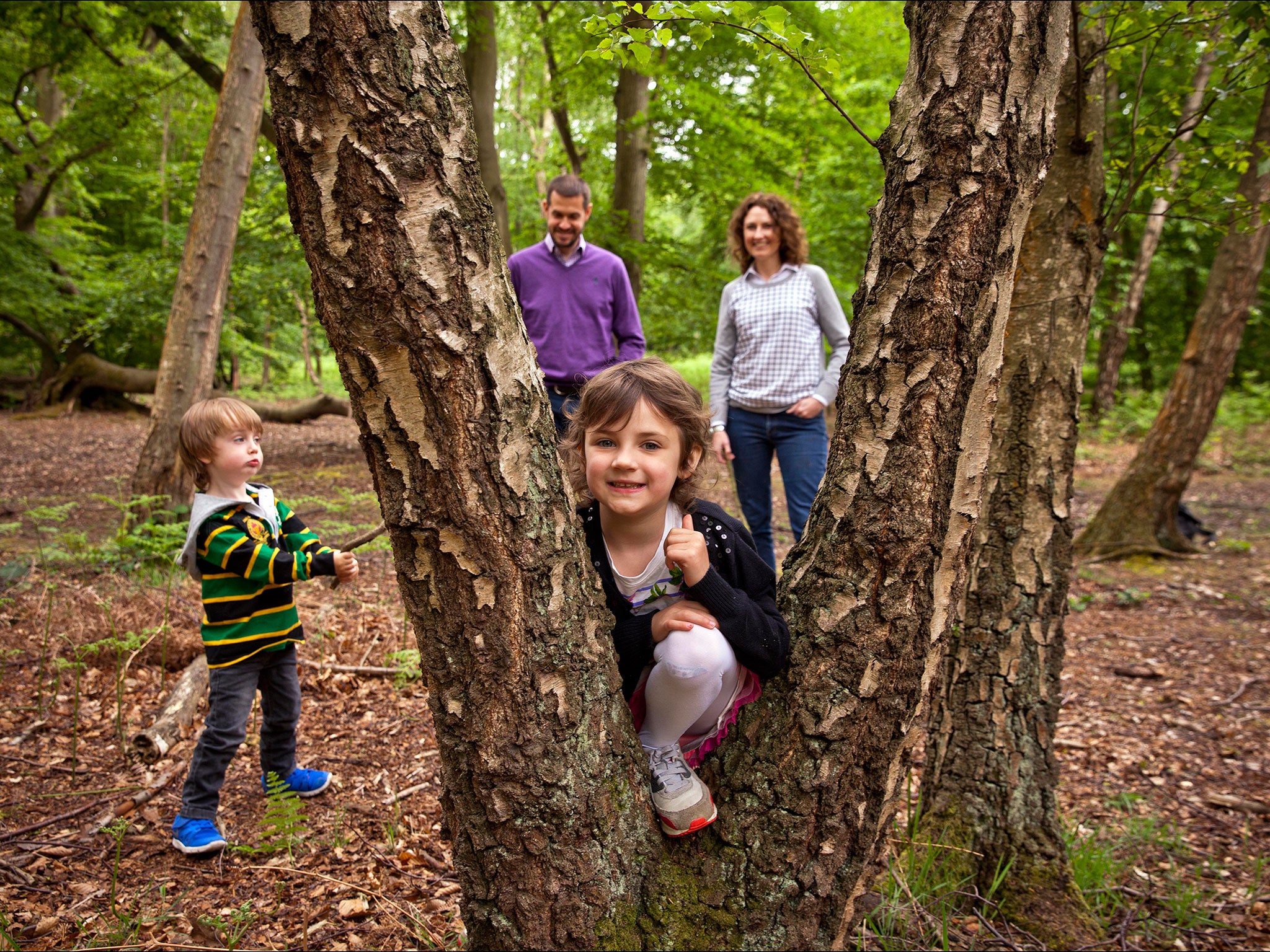Parents of four-year-old who beat leukaemia plan to climb Ben Nevis for cancer charity
After being diagnosed with leukaemia aged two, Karen Attwood's daughter had a long and dangerous road ahead. Three years on, Yasmin is cancer-free and her family is about to take on a new challenge - scaling Ben Nevis – to help other children

Your support helps us to tell the story
From reproductive rights to climate change to Big Tech, The Independent is on the ground when the story is developing. Whether it's investigating the financials of Elon Musk's pro-Trump PAC or producing our latest documentary, 'The A Word', which shines a light on the American women fighting for reproductive rights, we know how important it is to parse out the facts from the messaging.
At such a critical moment in US history, we need reporters on the ground. Your donation allows us to keep sending journalists to speak to both sides of the story.
The Independent is trusted by Americans across the entire political spectrum. And unlike many other quality news outlets, we choose not to lock Americans out of our reporting and analysis with paywalls. We believe quality journalism should be available to everyone, paid for by those who can afford it.
Your support makes all the difference.The first question a parent asks when told their child has cancer is: "What is the survival rate?" What you really mean, but can't quite bring yourself to say, is: "Is my child going to die?"
My daughter, Yasmin, was diagnosed with leukaemia in August 2012, shortly after her second birthday and when my son Isaac was just six weeks old.
A doctor came to deliver the diagnosis to my husband Andrew and me, her face full of bad news, as she told us to sit down. "What I am going to tell you right now is going to be life-changing," she said. "Yasmin has what is known as acute lymphoblastic leukaemia [ALL]."
I don't know what else she said to us. It all became a blur as we both went into shock. Andrew asked about survival rates and she told us it was around 50 per cent.
I'm not sure now how we got through that first night, googling statistics, texting and calling family and friends, but most of all wondering how we had ended up in every parent's nightmare – on a child cancer ward at Great Ormond Street Children's Hospital.
Yasmin had always been a lively and sociable child, ahead in her milestones and rarely sick, but she had started to get unwell in the June. Andrew and I began taking her into our local hospital, Whipps Cross, in east London, with mysterious pains in her arms and legs, causing her to limp. Doctors misdiagnosed Yasmin as having reactive arthritis, and because of this, she was not sent for further testing. Instead, we watched her deteriorate before our eyes.
When I had first taken her to A&E with her arm hanging down like a broken wing, she had been able to walk in. But after two months, she could not walk at all. Barely eating, she was a bag of bones, night sweats had matted her long curls to her face, her skin was pale as a ghost.
In the middle of all this, our beautiful son Isaac was born but it meant that Andrew and I didn't get more than 40 minutes' sleep in a row for about six months. We took it in turns to hold Yasmin's knees through the night to try and ease the agony.
After Andrew carried Yasmin into A&E on three consecutive days, each time being discharged with paracetamol and being told that Yasmin "must ride out the pain", we were finally admitted for further tests. After 10 days at Whipps Cross, we were transferred to Great Ormond Street for a bone marrow operation to "rule out leukaemia".
As leukaemia is a blood cancer, it is usually obvious from routine blood tests. But Yasmin's blood tests did not clearly show she had the disease and the only way of being certain if somebody has leukaemia is by examining the bone marrow.
Hours after arriving back at Whipps, we were told to pack an overnight bag and return to Great Ormond Street as they "had found something". The day after we were given the diagnosis, a different consultant came into Yasmin's room and told us that "the good news" that ALL was the most curable kind of childhood cancer and Yasmin's prognosis was 85 per cent for a complete cure. The odds were now in our favour.
I later learnt that in the 1960s, ALL had been a death sentence, with only about one in 10 children surviving five years. But now, thanks to the money that has poured into research, survival rates are around 90 per cent. The treatment is long – Yasmin began treatment immediately and it would last two and a half years.
The first couple of weeks we lived in the hospital. Some days I brought Isaac in to see Yasmin, accompanied by both grandmothers, who had moved in to help out in the early days.
After two weeks, we were discharged with a huge bag of medicines and a terrifying chart showing us when we had to administer which drugs. A lovely community nurse came every week for blood tests, but other than that, we had to keep Yasmin alive by ourselves, administering oral chemotherapy every day.
A month into treatment, Yasmin had an operation to fit a metal port into her chest, which would be accessed with a needle, weekly at first, so that a central line – or what child cancer patients call a "wiggly – could deliver chemotherapy straight into the veins.
I am writing this now not long after the end of treatment. I gave Yasmin her final dose of oral chemo on 31 October and her port came out in February after which she got to ring the End of Treatment Bell at Great Ormond Street while the medical team clapped and cheered. Although I am, of course, happy that the treatment is over, there is no sense of relief. Instead, I feel shell-shocked and am only just now beginning to process what we have gone through. Although so much time has passed, I remember almost everything in vivid detail. I recall every time we had to dash Yasmin into Whipps Cross, usually around midnight, when she had to be administered life-saving antibiotics, the first time wondering: "Is she going to be that one in 10 that doesn't make it?"
I remember her catching chicken pox from her brother, a life-threatening condition for those who have a suppressed immune system, and Yasmin being severely ill in hospital for five days.

I remember when she first started to lose her beautiful curls, and later when she was bald as an egg, and how sad her face was when she tried to put clips into wisps of hair growing back, and how once it had grown back, she lost it all again. I remember the hated steroids Yasmin took every month that transformed her personality so that I renamed her The Steroid Monster. I recall feeling abandoned by certain friends who barely got in touch, and at other times having to cancel all visitors when Yasmin's immune system was at zero. I remember walking around the where area we had recently moved to and therefore knew few people, pushing a buggy with my two babies, tears running down my face, feeling utterly alone and unable to cope.
But I also remember the smiles Isaac gave me each time I returned from the hospital to cuddle him tight, the huge support we got from charities such as Haven House Children's Hospice, the first place I could leave Yasmin alone to play and be cared for, and the Rainbow Trust who sent support workers around once a fortnight. I remember the friend who cooked meals and the friend who would come when I was housebound and at my very worst, to entertain the kids all day long, creating disco parties at home. I remember the love of our families who helped us keep it together and the wonderful staff of our incredible NHS at both Whipps Cross and Great Ormond Street, who saved our daughter's life.
Most of all, I remember the strength of our daughter, who was always laughing, who rarely complained and who would recover immediately after every procedure, even after having a huge needle pushed slowly – yes, I remember how slowly – into the large muscle in her leg without any anaesthetic.
People often say to us, I don't know how you managed it – but really what choice did we have? I know now that I never knew before what real adrenaline feels like and how it is possible to stay alive while holding your breath.
One activity that helped me, as a writer, and my husband, a photographer, was starting a blog ourlifewithleukaemia.blogspot.co.uk. I can't say it helped us make sense of it but it did enable me to get my thoughts out. Via the blog, we have raised more than £30,000 for various charities and on 30 May we will be hiking Ben Nevis for Children with Cancer UK. Like many parents who experience something so horrific, we want to do anything we can to help others in the same situation.
Another remark people sometimes make is: "You were so unlucky."
But no, really, we were not. Yasmin, now almost five, started school in September. She loves her teachers, ballet classes and playing with her friends.
When I look at her, fizzing with health and vitality, no longer a toddler but a little girl, proudly twisting her fingers around the curls thickening around her ears, I have to catch my breath.
You cannot go through something so traumatic without it being profoundly life-changing. It's not all positive: I have a fear of death that was not with me before, a dread of leaving my children.
But I am no longer the mother of a child with cancer. And as I snuggle up to my two happy, healthy children, breathing in their precious scent, I have never felt so lucky.
Karen and Andrew are hiking Ben Nevis for Children With Cancer UK. You can support them here.
Join our commenting forum
Join thought-provoking conversations, follow other Independent readers and see their replies
Comments